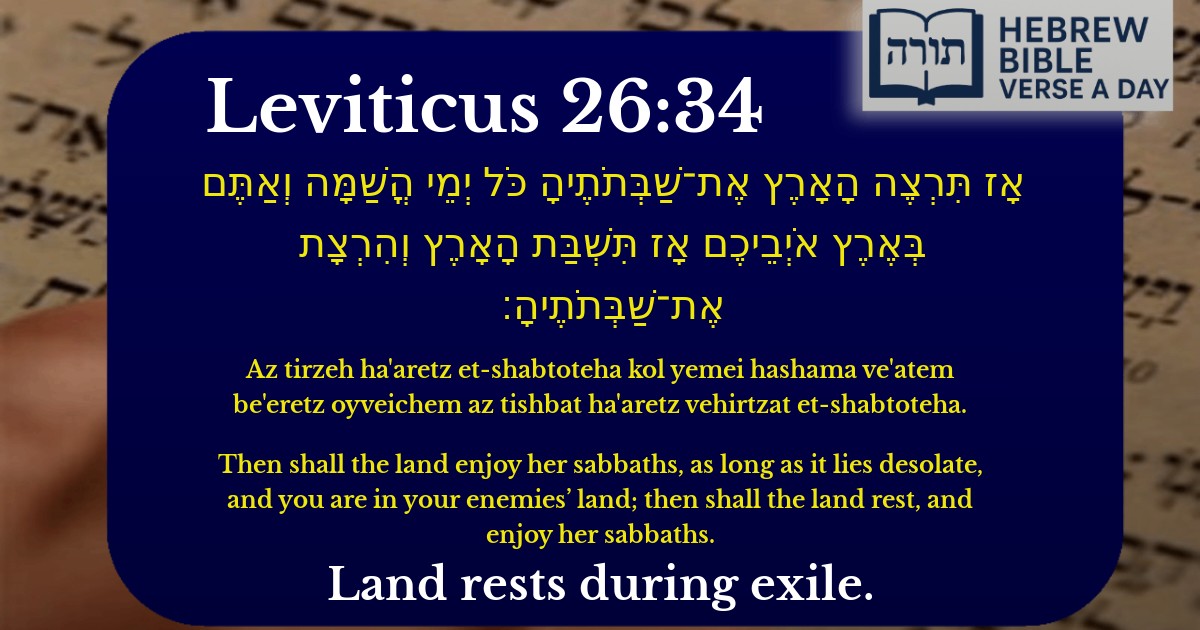Join Our Newsletter To Be Informed When New Videos Are Posted
Join the thousands of fellow Studends who rely on our videos to learn how to read the bible in Hebrew for free!
Hebrew Text
אָז תִּרְצֶה הָאָרֶץ אֶת־שַׁבְּתֹתֶיהָ כֹּל יְמֵי הֳשַׁמָּה וְאַתֶּם בְּאֶרֶץ אֹיְבֵיכֶם אָז תִּשְׁבַּת הָאָרֶץ וְהִרְצָת אֶת־שַׁבְּתֹתֶיהָ׃
English Translation
Then shall the land enjoy her sabbaths, as long as it lies desolate, and you are in your enemies’ land; then shall the land rest, and enjoy her sabbaths.
Transliteration
Az tirzeh ha'aretz et-shabtoteha kol yemei hashama ve'atem be'eretz oyveichem az tishbat ha'aretz vehirtzat et-shabtoteha.
Hebrew Leining Text
אָז֩ תִּרְצֶ֨ה הָאָ֜רֶץ אֶת־שַׁבְּתֹתֶ֗יהָ כֹּ֚ל יְמֵ֣י הׇשַּׁמָּ֔הֿ וְאַתֶּ֖ם בְּאֶ֣רֶץ אֹיְבֵיכֶ֑ם אָ֚ז תִּשְׁבַּ֣ת הָאָ֔רֶץ וְהִרְצָ֖ת אֶת־שַׁבְּתֹתֶֽיהָ׃
אָז֩ תִּרְצֶ֨ה הָאָ֜רֶץ אֶת־שַׁבְּתֹתֶ֗יהָ כֹּ֚ל יְמֵ֣י הׇשַּׁמָּ֔הֿ וְאַתֶּ֖ם בְּאֶ֣רֶץ אֹיְבֵיכֶ֑ם אָ֚ז תִּשְׁבַּ֣ת הָאָ֔רֶץ וְהִרְצָ֖ת אֶת־שַׁבְּתֹתֶֽיהָ׃
🎵 Listen to leining
Parasha Commentary
📚 Talmud Citations
This verse is quoted in the Talmud.
📖 Arakhin 32b
The verse is discussed in the context of the laws concerning the Sabbatical year (Shemittah) and the Jubilee year (Yovel), emphasizing the land's rest during periods of desolation.
📖 Megillah 14a
Referenced in a discussion about the prophets and their messages regarding the consequences of not observing the Sabbatical years.


Context in the Torah
The verse (Vayikra 26:34) appears in the Tochacha (Rebuke), where Hashem warns of the consequences of failing to observe the mitzvos, particularly the neglect of the Shemittah (Sabbatical year). Rashi explains that the land will "enjoy its Sabbaths" by lying fallow during the exile, compensating for the 70 Shemittah years that Bnei Yisrael failed to observe during their 490-year tenure in Eretz Yisrael (based on Divrei Hayamim II 36:21).
The Concept of Shemittah
Rambam (Hilchot Shemittah V’Yovel 10:8-11) elaborates that Shemittah is not merely an agricultural law but a spiritual discipline—affirming Hashem’s ownership of the land. When Bnei Yisrael disregard this, the land "forces" its rest through exile. The Sforno adds that the desolation is not punitive but restorative, allowing the land to spiritually recharge from years of misuse.
Midrashic Insights
Exile as Rectification
The Kli Yakar highlights the parallel between the land resting and Bnei Yisrael dwelling "in their enemies’ land." Just as the land atones through rest, the people atone through displacement, ultimately leading to renewal. This mirrors the Shabbat cycle—labor followed by sanctified rest—applied nationally.
Contemporary Implications
Rav Kook (Orot HaTeshuvah 9:7) interprets this dynamically: Exile is not merely punishment but a cosmic recalibration. The land’s forced rest mirrors the soul’s need for introspection during hardship, preparing for eventual redemption. The Chatam Sofer adds that observing Shemittah today—even mid’rabbanan—honors this covenant, preventing future exile.